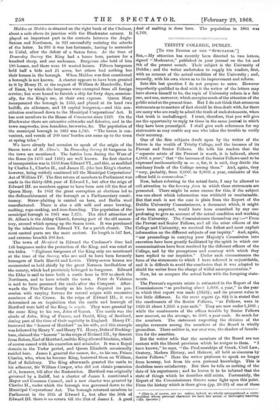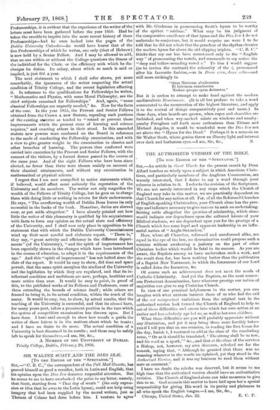TRINITY COLLEGE, DUBLIN.
[To THE EDITOR OF THE "SPECTATOR."] SIR,—My attention has recently been directed to two letters, signed " Moderator," published in your journal on the 1st and 8th of the present month. Their subject is the University of Dublin ; and the writer undertakes to supply his readers, first, with an account of the actual condition of the University ; and, secondly, with his own views as to its improvement and reform.
Into this last question I do not propose to enter. However imperfectly qualified to deal with it the writer of the letters may have shown himself to be, the topic of University reform is a fair one, and one, moreover, which occupies much of the attention of the public mind at the present time. But I do not think that erroneous statements as to matters of fact should be thus dealt with, for there are many who are ready to admit the truth of such statements, when that truth is unchallenged. I trust, therefore, that you will give me the opportunity to reply to these in the same journal in which they have been promulged. I shall give such references for my statements as may enable any one who takes the trouble to verify their accuracy.
One of the first subjects dwelt upon by the writer of the letters is the wealth of Trinity College, and the incomes of its Provost and Senior Fellows. He tells his readers that the " separate estate of the Provost is worth, it is believed, about 4,000/. a year;" that " the incomes of the Senior Fellows used to be expressed mathematically as = x, for, it is said, they divide the residuary funds of the College among them." And, again, they "vary, probably, from 2,0001. to 3,000/. a year, exclusive of the offices held in commendam."
Now, before referring to the actual facts, I may be allowed to call attention to the hearsay form in which these statements are presented. There might be some excuse for this, if the subject was one about which information was withheld or unattainable. But that such is not the case is plain from the Report of the Dublin University Commissioners, a document which, it might have been expected, would have been consulted by any one professing to give an account of the actual condition and working of the University. The Commissioners themselves say :—" From the Provost and Senior Fellows, and all the other officers of the College and University, we received the fullest and most explicit information on the different subjects of our inquiry." Aud, again, "our proceedings in carrying your Majesty's Commission into execution have been greatly facilitated by the spirit in which our communications have been received by the different officers of the College, and by the promptness and courtesy with which they have replied to our inquiries." Under such circumstances the form of the statements to which I have referred is unjustifiable, and it is difficult to avoid the conclusion that it was adopted to shield the writer from the charge of wilful misrepresentation.*
Now, let us compare the actual facts with the foregoing state- ments.
The Provost's separate estate is estimated in the Report of the Commissioners "as producing about 1,6001. a year," in the year in which that report was made (1853) ; and its present value is but little different. In the same report (p. 89) it is stated that the emoluments of the Senior Fellows, "as Fellows, were in 1850-51 about 1,250/. a year each." They are now under 1,100/. ; while the emoluments of the offices tenable by Senior Fellows now amount, on the average, to 3001. a year each. So much for the numbers. The statement respecting the division of the surplus revenues among the members of the Board is wholly groundless. There neither is, nor ever was, the shadow of founda- tion for the assertion.
But the writer adds that the members of the Board are not content with the liberal provision which he assigns to them. "I have known," he says, "the Professorships of Greek, Civil Law, Oratory, Modern History, and Hebrew, all held as sinecures by Senior Fellows." Here the writer professes to speak no longer
from hearsay, but from his own personal knowledge. This is doubtless more satisfactory. But then he tells us nothing of the date of his experiences ; and he leaves it to be inferred that the state of things which he describes still exists. Fortunately, the
Report of the Commissioners throws some light upon this point. From the history which is there given (pp. 28-29) of one of these
* [This is, of course, not so; unless, indeed, we wholly misapprehend a corre- spondent whose personal character we have fair means of thoroughly knowing. —En. Spectator.]
Professorships, it is evident that the experience of the writer of the letters must have been gathered before the year 1850. Had he taken the trouble to inquire into the more recent history of these Professorships—had he even looked into the pages of the Dublin University Calendar—he would have learnt that of the five Professorships of which he writes, one only (that of Hebrew) is now held by a Senior Fellow. And I may be allowed to add, that no one within or without the College questions the fitness of the individual for the Chair, or the efficiency with which he dis- charges its duties. Its salary, about which so much is said or implied, is just 601. a year.
The next statement to which I shall refer shows, yet more
remarkably, the ignorance of the writer respecting the actual condition of Trinity College, and the recent legislation affecting it. In reference to the qualifications for Fellowships he writes, " Mathematics and Physics, with some Moral Philosophy, are the chief subjects examined for Fellowships." And, again, "some classical Fellowships are urgently needed," &c. Now for the facts of the case. In the year 1855, the Provost and Senior Fellows obtained from the Crown a new Statute, repealing such portions of the existing statutes as tended to " retard or prevent those improvements which the present state of learning and science requires," and enacting others in their stead. In this amended statute new powers were conferred on the Board in reference to the mode of conducting the Fellowship examination, and with a view to give greater weight in the examination to classics and other branches of learning. The powers thus conferred were carried into execution by the Provost and Senior Fellows, with the consent of the visitors, by a formal decree passed in the course of the same year. And of the eight Fellows who have been since elected, no fewer than three were chosen mainly on account of their classical attainments, and without any examination in mathematical or physical science.
I regret that I am now compiled to notice statements which,
if believed, would affect more seriously the reputation of the University and its members. The writer not only magnifies the wealth of the Fellows of Trinity College, but he goes on to charge them with doing little or nothing in return for their endowments. He says, " The overflowing wealth of Dublin Dons leaves its only memorial in the books of the bank. Meantime, duties are slurred over, or put aside altogether." I have already pointed out how little the writer of this pleasantry is qualified by his acquaintance with facts to form any opinion on the actual state and efficiency of the University, and I shall now only place in opposition to his statement that with which the Dublin University Commissioners wind up their most careful and elaborate report. " There is," they say, " great activity and efficiency in the different depart- ments" (of the University), " and the spirit of improvement has been especially shown in the changes which have been introduced in the course of education, to adapt it to the requirements of the age." And this "spirit of improvement" has not halted since the date of the report. It would be easy to show, did time and apace permit, that the same spirit energizes the studies of the University and the legislation by which they are regulated, and that its in- tellectual condition and usefulness are now, perhaps, healthier and more active than ever. It would be easy to point, in proof of this, to the published works of its Fellows and Professors, some of them extending the bounds of science itself ; while others are framed to bring it, in its actual condition, within the reach of the many. It would be easy, too, to show, by actual results, that the teaching of the University is successful, and that its alumni have, for many years past, taken a prominent position in the race which the system of competitive examination has thrown open. But I have done. I have said enough to show how unsafe a guide the writer of these letters is in the matters about which he treats ; and I have no desire to do more. The actual condition of a University is best discerned in its results ; and these may be safely left to speak for themselves.—I am, Sir, &c.,































 Previous page
Previous page